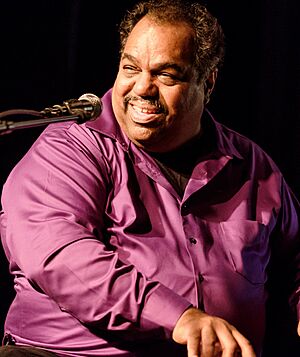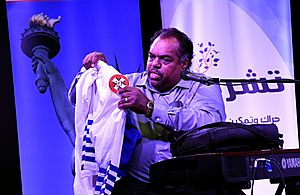Daryl Davis facts for kids
Quick facts for kids
Daryl Davis
|
|
|---|---|

Davis performing in 2017
|
|
| Born | March 26, 1958 Chicago, Illinois, U.S.
|
| Occupation |
|
| Years active | 1980s–present |
| Known for |
|
| Musical career | |
| Genres | |
| Instruments |
|
| Labels | Lyrad |
Daryl Davis, born on March 26, 1958, is an American musician. He plays R&B and blues music. He is also known as an activist. He is famous for fighting racism. He talks with members of the Ku Klux Klan (KKK). His work has helped many people leave the KKK and speak out against it.
Daryl Davis plays an energetic style of boogie-woogie piano. He has performed with famous musicians. These include Chuck Berry, Jerry Lee Lewis, and B. B. King. A documentary film about him, Accidental Courtesy, came out in 2016.
Contents
Early Life and Experiences
Daryl Davis was born in Chicago, Illinois. His father worked for the Department of State. Because of his father's job, Daryl moved around the world. He lived in many different countries when he was young. These included countries in Africa.
In these countries, schools were often mixed. Children from many nations and backgrounds learned together. When Daryl was ten, he returned to the United States. He joined a Cub Scout pack in Belmont, Massachusetts. This group had been all white before.
First Experience with Racism
During a parade, Daryl was carrying the flag. People in the crowd threw rocks and bottles at him. The adult leaders had to protect him. Daryl did not understand why this happened. His father then explained racism to him for the first time. This event made Daryl curious about why people have racist ideas. This curiosity shaped much of his future work. Daryl Davis is a Christian.
Music Career and Style
Daryl Davis learned from blues musicians. These musicians came from the Mississippi Delta region. They moved north, bringing their music with them. In 1980, Davis earned a music degree. He studied at Howard University. He was part of the university's choir and jazz group.
Mentors and Performances
Famous pianists Pinetop Perkins and Johnnie Johnson mentored Davis. They both called him their godson. They praised his skill at playing piano styles that were popular long before he was born.
Davis often played backup for Chuck Berry and Jerry Lee Lewis. He was friends with Muddy Waters. He played piano in The Legendary Blues Band. Davis also performed with blues legend B. B. King. He has played with many other artists. These include Elvis Presley's Jordanaires and The Platters.
Awards and Recognition
In 2009, Davis won an award. He was named "Best Traditional Blues/R&B Instrumentalist." This was at the Washington Area Music Awards. For several years, Davis was the artistic director. He worked at the Centrum Acoustic Blues Festival.
A reviewer in Living Blues Magazine praised his work. They wrote that "Davis' piano work impresses with his winning combination of technique and abandon." They also said his "vocals are strong and assured."
Music Albums
- American Roots (2000)
- Alternate Routes (2008)
- Greatest Hits (2011)
Activism Against Racism

Daryl Davis works to improve race relations. He does this by finding and talking with members of the Ku Klux Klan. He tries to become friends with them. In 1983, he was playing music in a bar. A customer told him he played as well as Jerry Lee Lewis. Davis explained that Jerry Lee learned from black blues players. The customer then said he was a KKK member.
Meeting KKK Members
The two became friends. The man later gave Davis contact information for KKK leaders. A few years later, Davis decided to interview Klan members. He wanted to write a book. He wanted to answer the question he had since he was ten: "Why do you hate me when you know nothing about me?"
Davis met with Roger Kelly, a KKK leader in Maryland. Davis did not tell Kelly he was black before the meeting.
My secretary called him, and I told her, 'do not tell Roger Kelly I'm black. Just tell him I am writing a book on the Klan'. I wanted her to call because she's white. I knew enough about the mentality of the Klan that they would never think a white woman would work for a black man. She called him and he didn't ask what color I was, so we arranged to meet at a motel.
The meeting was tense. Kelly brought a bodyguard with a gun. But Davis and Kelly eventually became friends. Kelly even invited Davis to be his daughter's godfather. When Kelly left the Klan, he gave his robe to Davis.
Impact on KKK Members
Davis has befriended over twenty KKK members. He believes he has directly helped between forty and sixty people leave the Klan. He thinks he has indirectly helped over two hundred. Davis found that Klansmen often have wrong ideas about black people. These ideas come from being taught hate when they were young. When they got to know him, it was harder for them to keep their prejudices.
He wrote about his experiences in his 1998 book, Klan-destine Relationships: A Black Man's Odyssey in the Ku Klux Klan. Klan members have often invited Davis to their meetings. They have given him their robes and hoods. By 2016, Davis had collected 25 or 26 robes.
Davis believes he helped break up the KKK in Maryland. He says things "fell apart" after he started talking with its members there. He says, "The lesson learned is: ignorance breeds fear. If you don't keep that fear in check, that fear will breed hatred. If you don't keep hatred in check, it will breed destruction."
Different Views on His Work
Some of Davis's friends find his interest in the Klan unusual. Adolph Wright, a friend, says Davis "is attracted to controversy." He told The Washington Post that "When the crowd goes right, he goes left."
Davis's father, William B. Davis, thought his son talked to the Klan to understand their hatred. He wanted to find common ground. He told The Washington Post that his son "has done something that I don't know any other black American, or white American, has done."
Accidental Courtesy Documentary
The 2016 documentary film Accidental Courtesy: Daryl Davis, Race & America shows Davis talking with KKK members. It also shows different views on his work. These views come from groups like the Southern Poverty Law Center and Black Lives Matter.
Minds Social Network
Daryl Davis is an advisor for the social network Minds. He uses this platform to teach people. He shows them how to have respectful conversations. This helps people find common ground and build tolerance.
In an interview, Davis said that Minds is an "open forum." People can share different ideas and beliefs there. He believes that "the art of conversing with one another has been lost." He thinks this platform helps people be open and talk.
Davis believes that education is the best way to stop hate. He says, "If you fix the ignorance, there's nothing to fear. If there's nothing to fear, there's nothing to hate. If there's nothing to hate, there's nothing or no one to destroy."
In November 2019, Minds and Davis started the Deradicalization Initiative. This project fights online extremism. It offers workshops and educational materials. It also gives ideas for promoting tolerance.
Changing Minds Podcast
As part of the Deradicalization Initiative, Davis hosts a podcast. It is called Changing Minds. The show covers many topics. These include politics, music, and race. Guests on the show are also varied. They have included:
- Former KKK leader Scott Shepherd.
- Former Al-Qaeda recruiter Jesse Morton.
- David Kaczynski, brother of "Unabomber" Ted Kaczynski.
- Charles Berry Jr., Chuck Berry's son.
- Blues guitarist Bob Margolin.
- Documentary director Deeyah Khan.
- Journalist Brian Karem.
Acting Career
Daryl Davis has acted on stage, in films, and on television. He played a small role in the HBO TV series The Wire. He also appeared on stage in plays. These include William Saroyan's The Time of Your Life. He also performed in Elvis Mania in New York City. He received good reviews for his role in Zora Neale Hurston's Polk County.

